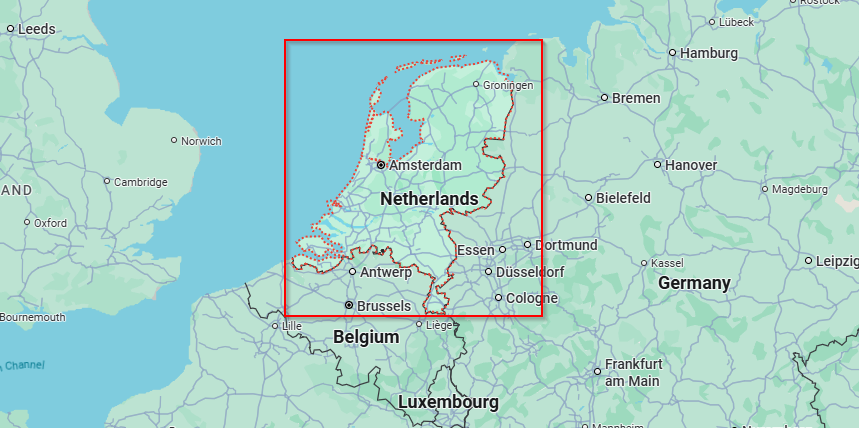Why the Netherlands? Main Features for Businesses
- Strategic EU Hub: Direct access to the EU single market (500+ million consumers). Europe’s largest port (Rotterdam) and main airport (Schiphol) enable world-class international logistics.
- Business-Friendly Legal and Fiscal Climate: Predictable rule of law, English proficiency (93%), and a stable, transparent regulatory framework.
- Competitive Tax Structure: Corporate income tax rates of 19% (up to €200,000) and 25.8% (above €200,000) are paired with innovation-friendly tax regimes.
- Innovation Powerhouse: Top-5 globally in innovation rankings; world-leading incentives for R&D, high-tech, and sustainability sectors.
- Sector Specialization: Excels in logistics, agrifood, life sciences, technology, and international holding company management.
- Best For: Holdings, tech startups, logistics, R&D-driven businesses, international trading companies, and EU headquarters.

Core Legal Forms of Companies
| Legal Form | Minimum Capital | Founders | Key Features |
|---|---|---|---|
| Besloten Vennootschap (BV) | €0.01 | 1 | Most common; limited liability; flexible shares |
| Naamloze Vennootschap (NV) | €45,000 | 1 | For larger/public ventures; can list shares |
| Branch Office | N/A | Parent | Extension of foreign company; not a legal entity |
| Sole Proprietor | N/A | 1 | For individuals; unlimited liability |
Key Points:
- 100% foreign ownership allowed; no residency restriction for directors/shareholders.
- UBO (ultimate beneficial owner) registration required for all companies.
- Shares may be held by individuals or legal entities.
- Remote incorporation possible with Power of Attorney.
- BVs are overwhelmingly preferred for their flexibility, minimum capital, and limited liability.
Taxation System and Optimization Opportunities
Corporate Income Tax (CIT)
- Rates:
- 19%: Up to €200,000 taxable profit.
- 25.8%: Above €200,000.
- Participation Exemption: 100% exemption for qualifying dividends and capital gains from subsidiaries (generally ≥5% holding, active business, non-hybrid structure).
- Innovation Box: Profits from self-developed qualifying IP can be taxed at just 9%.
- R&D Tax Credits (WBSO): Wage subsidy/refund for eligible R&D activities (32% for first €350,000 costs, 16% above).
- Investment Allowances:
- Energy Investment Allowance (EIA): 40% deduction on energy-efficient investments.
- Environmental Investment Allowance (MIA): Up to 45% deduction for green investments.
- Arbitrary Depreciation (Vamil): Up to 75% immediate write-off for some green assets.
- Group Relief: Fiscal unity allows profit/loss pooling within groups.
- Loss Carryforward: Unlimited (offset limited to €1M/year after the first €1M profit); 1-year carryback.
Optimization Tips:
- Structure as a holding to benefit from the participation exemption.
- Maximize use of WBSO and the Innovation Box for substantial tax reductions.
- Use group relief to offset profits and losses among Dutch group companies.
- Claim energy or environmental investment deductions when eligible.
Other Taxes
| Tax Type | Rate/Threshold | Notes |
|---|---|---|
| VAT (BTW) | 21% standard; 9% reduced | Registration threshold: €20,000 turnover |
| Social Security | Employer: 25–36%; Employee: ~25–33% | Employer/employee combined, varies by sector, max base €75,864 |
| Dividend WHT | 15% (can be 0% in EU/EEA) | Participation exemption/treaties may apply |
| Interest/Royalties | 0% generally; 25.8% to tax havens | Withholding applies only to abusive/tax haven cases |
| Property Tax | Municipality-specific | Levied on business premises |
| Payroll Tax | Progressive | Collected at source |
VAT Registration: Mandatory if turnover exceeds €20,000/year (domestic), €10,000 for cross-border EU sales.
Ease of Doing Business and Government Policy
Rankings and Business Climate
- Globally Respected: Ranked 42nd by the World Bank’s latest index, higher in innovation and logistics categories.
- Strong Digital Administration: All business services, filings, and tax returns are online. Chamber of Commerce (KvK) is one-stop-shop for formations.
- Fast Company Startup: BVs can be registered in 1–3 business days (notary deed required).
- Sector Policies:
- Lenient/Supportive: Technology, logistics, high-tech, life sciences, green energy, international headquarters, and creative sector.
- Stricter: Financial services (AML/CTF control), gambling, defense, real estate, and any sector with regulatory or public interest concerns.
Government Initiatives and Support
- Netherlands Enterprise Agency (RVO): Central grants body for innovation, sustainability, and entrepreneurship. Key programs:
- Innovation Credit, Seed Capital, Early Stage Financing, MIT grants.
- Support for export, digitalization, and energy transition.
- Top Sector Policy: Focuses funding on agri-food, high-tech, logistics, life sciences, energy, creative industries, and more.
- Startup Visa: Special residence permit for non-EU founders with an approved facilitator.
Company Formation: Process, Cost, and Shareholding
Formation Steps
- Name Check: KvK (Chamber of Commerce).
- Prepare Deed: Articles of Association/formation deed drafted by a Dutch civil-law notary.
- Notary Signing: Can be done remotely; all directors and shareholders must identify themselves (digital means possible).
- KvK Registration: Immediate entry in the business register.
- Bank Account: Open a business account (in practice, may require a director to be physically present for KYC).
- Tax Registration: Company is automatically registered for tax/VAT; UBO must be registered.
Timeline & Costs
| Item | Typical Cost (2025) |
|---|---|
| KvK Registration Fee | €82.25 |
| Notary/Legal Fees | €500–€1,000 (BV) |
| Professional Package | €799–€2,200 |
| Share Capital (BV) | €0.01 minimum; €1 customary |
| Virtual Office/Address | €100–€300/year |
- Physical Presence: Not required for directors/shareholders; bank account opening may require a physical meeting.
- Shareholding: 100% foreign ownership allowed; one or multiple shareholders; shares can be held by individuals or legal entities.
- UBO Registry: Mandatory for all companies.
Grants and Funding Opportunities
National Programs
- WBSO (R&D Wage Subsidy): €1.6B budget for technological innovation, 32% rebate on first €350,000 R&D wage, 16% above that.
- Innovation Box: 9% CIT for qualifying IP income.
- Innovation Credit, Seed Capital, Early Stage Financing: €150M+ annual allocation; up to €50M per project in loans or equity.
- MIT Scheme: For SME innovation, feasibility, and cooperative R&D projects.
- BMKB/GO: Loan guarantees for small and medium-sized companies and midcaps.
EU and International Funding
- Horizon Europe, Eurostars, EIC Accelerator: Grants for R&D and innovation, including non-dilutive funding up to €2.5M and equity options up to €10M.
Sector-Specific
- Energy Investment Allowance (EIA): 40% deduction for energy-saving investments.
- Environmental Investment Deduction (MIA): Up to 45% for green technologies.
Governance and Compliance
- Annual Reporting: Balance sheet, profit/loss, notes, and, if audited, cash flow and equity changes. Filing due within five months of year-end.
- Audit: Required if company meets at least two of: assets > €6M, revenue > €12M, staff > 50 (for two consecutive years).
- ESG & Sustainability: Corporate Sustainability Reporting Directive (EU CSRD) applies to large companies from 2025, SMEs from 2027—requires double materiality analysis and digital reporting.
- UBO Register: All companies must file and update ultimate beneficial owner info.
- Tax Filing:
- CIT: Return due within five months after fiscal year-end.
- VAT: Returns (monthly/quarterly/annual).
- Payroll/Social Security: Digital, monthly returns.
- Transfer Pricing: Documentation aligned with OECD for intercompany transactions.
Conclusion
The Netherlands in 2025 is one of the most competitive, innovation-driven, and internationally connected corporate tax jurisdictions in Europe:
- Attractive CIT rates (19%/25.8%), with leading incentives for R&D and IP.
- Fast, reliable formation—remote incorporation, flexible ownership, and digital administration.
- Comprehensive government grants—€1.6B+ for innovation, green investment, and startup support.
- Strategic EU and global access, with world-class infrastructure and gateway position for trade, logistics, and holding companies.
- Strong compliance culture, requiring timely reporting, tax filings, UBO registration, and—starting 2025—mandatory ESG disclosures for large firms.
Considerations: Social security contributions are notable (25–36% of salary), VAT and payroll taxes are rigorously enforced, and companies must be ready for new EU-mandated ESG and digital reporting requirements.
Entrepreneurs and investors will find the Netherlands a cost-efficient, legally stable, and innovation-friendly base—ideal for technology-driven, growth-oriented, and globally-focused businesses seeking competitive EU access and long-term growth.
Useful Links
1. Understanding Company Structures in the Netherlands (2023)
2. Private limited company – Wikipedia (2024)
3. Tax rates in the Netherlands 2025 – NordicHQ (2024)
4. Viotta Law, “Difference between BV and NV” (2023)
5. Dentons, Dutch Tax Plan 2025 (2024)
6. Dutch Corporate Governance Code – MCCG (2025)
7. Business.gov.nl, Registration at KVK (2018)
8. World Bank Doing Business Data – Netherlands (2020)
9. Commenda, “LLC Registration in Netherlands” (2025)
10. PwC Worldwide Tax Summaries – Fiscal Unity (2024)
11. Corporate Tax in the Netherlands – Wikipedia (2024)
12. Invest in Holland, Taxes & Incentives 2024
13. Taxology-global, Dividend Withholding Tax Netherlands (2025)
14. Deloitte Netherlands Highlights 2024
15. Government.nl, Corporate Income Tax (2024)
